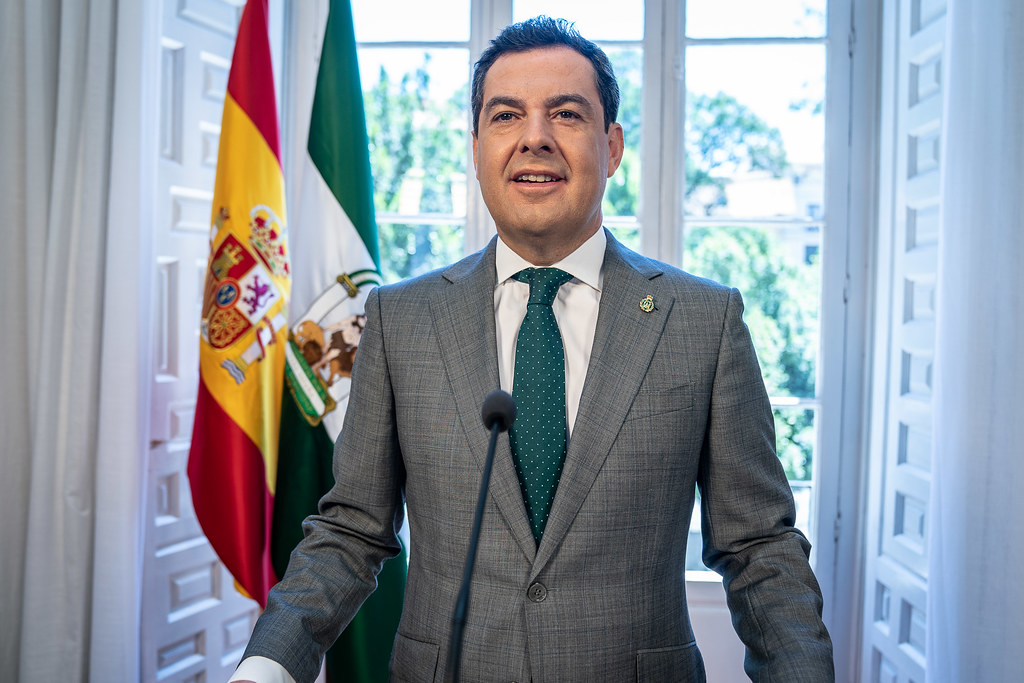SPAIN’S age-old regional tensions have once again reared their head as historically poorer Andalucia leads a rebellion against plans to forgive the debt of wealthier Catalunya.
The Andalucian president, Juanma Moreno, has formed an alliance with leaders in other PP-controlled regions to oppose the €83 billion package.
The debt forgiveness plan, approved by the Spanish government on Tuesday, aims to help regional administrations pay off their debts and free up resources for public spending.
However, it has exposed deep-seated tensions about fiscal fairness and regional equality that have simmered in Spanish politics for decades.
Moreno signed a cooperation agreement with Cantabria’s president Maria Jesus Saenz de Buruaga this week that explicitly commits both regions to opposing measures they view as creating inequality between Spanish regions.
The PSOE government has defended the debt relief as necessary economic support that will benefit multiple regions – and even offered it to PP-controlled Andalucia.
Officials point out that seven out of every ten euros forgiven will actually help areas controlled by opposition parties, not just Catalunya.
However, critics argue the timing and structure of the relief package primarily serves to maintain the government’s parliamentary majority by effectively bribing Catalan independence parties for their support.
“We are facing yet another concession by [Spanish Prime Minister Pedro] Sanchez to fulfil his commitments [to Catalan independence-supporting parties] and hold out for another week, another month, another year in power,” Moreno declared at a joint press conference with his Cantabrian counterpart.
The dispute reveals a striking role reversal in Spain’s traditional regional dynamics.
Catalans have long argued they send far more tax revenue to Madrid than they receive back – around 20% of Spain’s GDP flows through Catalunya, yet the region claims it gets proportionally less public investment in return.
For decades, wealthy Catalunya has complained about subsidising poorer regions like Andalucia through the country’s fiscal transfer system.
Now the tables have turned.
Moreno argues that Andalucia, unlike Catalunya, ‘doesn’t have a debt problem’ and doesn’t require the relief being offered.
Instead, Moreno insists the real debate should focus on reforming Spain’s entire regional financing system rather than providing what he sees as ad-hoc solutions.
Thus Andalucia, despite typically receiving more public spending per capita than it generates in tax revenue, is refusing to return the favour for cash-strapped Catalunya.
It represents a remarkable shift in Spanish internal politics, where the usual dynamic of wealthy regions complaining about supporting poorer ones has been flipped on its head.
Cantabrian President Saenz de Buruaga has been equally critical, calculating that the debt relief will effectively transfer €523 of Catalan debt to every resident of Cantabria as Spanish taxpayers.
READ MORE: Princess Leonor of Spain begins final year of military training at Air Force academy
She describes this as an unacceptable burden on citizens who had no role in creating Catalunya’s debt situation.
The dispute is occurring against the backdrop of Spain’s multi-party democracy, where national governments often rely on support from regional parties to maintain parliamentary majorities.
In this case, Pedro Sanchez requires the support of various pro-independence parties not just in Catalunya but also the Basque Country to stay in power.
Chiefly Esquerra Republicana de Catalunya (ERC) and Junts per Catalunya in Catalonia, and Euskal Herria Bildu (EH Bildu) in the Basque Country, whose parliamentary votes are critical for passing budgets and legislation in a deeply fragmented Congress.
Click here to read more Politics News from The Olive Press.








